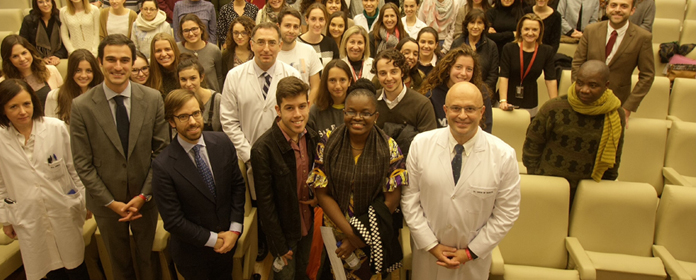Celine Tendobi: “En el Congo cada año mueren por SIDA 24.000 personas”
La ginecóloga del Hospital Monkole afirma en la Universidad que “ser madre en este país exige mucho sacrificio”

FOTO: Manuel Castells
“Ser madre en mi país exige mucho sacrificio, debido a la ausencia de infraestructura médica y a las condiciones insalubres que provocan infecciones, entre otros problemas”. Así lo afirmó en la Universidad de Navarra la Dra. Celine Tendobi, ginecóloga del Hospital Monkole, quien ofreció una conferencia titulada ‘S.O.S Dar a luz en el Congo’, organizada por el departamento de Ginecología y Obstetricia de la Clínica y la Facultad de Medicina.
En la sesión también participaron Álvaro Perlado, director adjunto del Hospital de Monkole; el Dr. Luis Chiva y el Dr. Juan Luis Alcázar, director y codirector del departamento de Ginecología y Obstetricia de la Clínica Universidad de Navarra; y el Dr. Secundino Fernández, decano de la Facultad de Medicina.
La Dra. Tendobi explicó que las enfermedades tropicales o de transmisión sexual también son un problema añadido: “En el Congo cada año mueren por SIDA 24.000 personas y 78.000 por malaria”.
Por su parte, Álvaro Perlado relató la actividad que realiza el Hospital Monkole: “Atendemos a mujeres embarazadas desfavorecidas, proporcionándolas un seguimiento médico antes y después del parto”. Esta asistencia la desarrollan gracias al programa Forfait-Mamá “que permite a mujeres sin recursos de Kinshasa acceder a cuidados asistenciales de calidad en un entorno de extrema pobreza”. Hasta la fecha, Monkole ha atendido ya a 82.000 pacientes y ofrece trabajo a 200 personas.
De los casi 80 millones de habitantes que tiene la República Democrática del Congo, más de 60 millones viven en condiciones de extrema pobreza, principalmente en áreas urbanas, como la de Kinshasa. Además, 30.000 mujeres mueren durante el parto todos los años y más de 20.000 niños pierden la vida durante su alumbramiento o en los días inmediatamente posteriores.
Hospital MonkoleEn 1991 se puso en marcha en la capital congoleña el Hospital Monkole para ofrecer servicios sanitarios y hospitalización en uno de los barrios periféricos de Kinshasa, así como para promover la educación sanitaria en enfermedades como el VIH/SIDA, el paludismo y la tuberculosis. Se trata de una obra corporativa del Opus Dei.
Además, en 2010 se impulsó la iniciativa ‘Amigos de Monkole’ que facilita el acceso sanitario a los colectivos más desfavorecidos de la zona, así como la atención médica de niños sin recursos que el Hospital de Monkole recibe y atiende en el Servicio de Pediatría, Cirugía y en los tres dispensarios periféricos que dependen de él. Para ello cuenta con la colaboración de la ONG ONAY (Organización Navarra para Ayuda entre los Pueblos), la Clínica Universidad de Navarra y la Fundació Montblanc.




